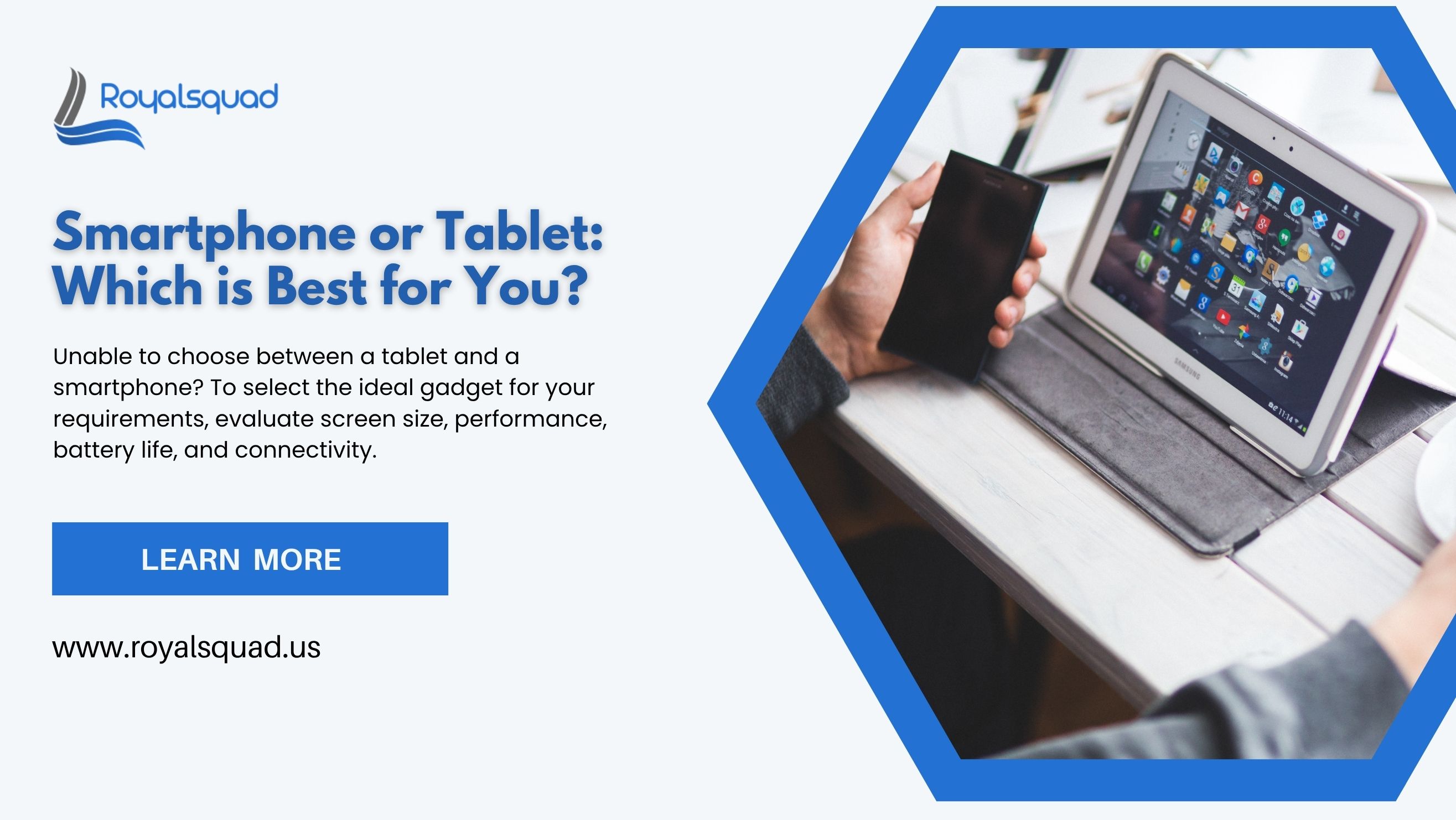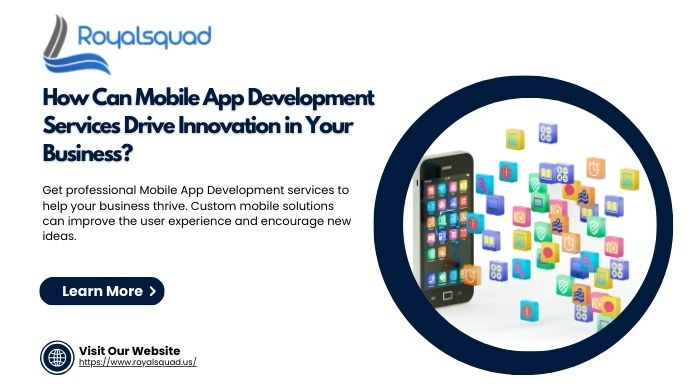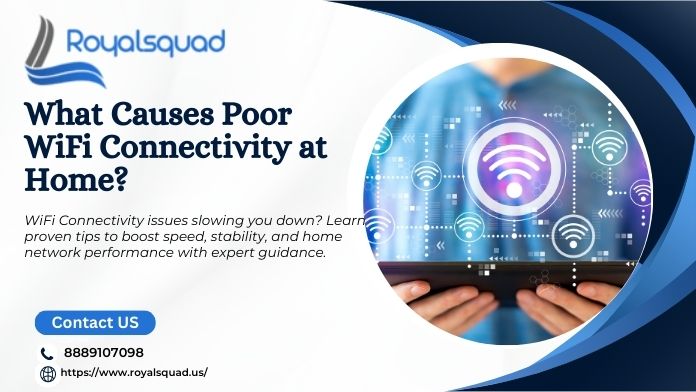
Smartphone or Tablet: Which is Best for You?
Selecting between a tablet and a smartphone might be difficult in today's fast-paced digital environment. Although each gadget has special benefits, Your needs, choice, and way of life will determine which option is best for you. Making an informed choice will be aided by understanding the primary differences, regardless of whether portability, productivity, entertainment, or accessibility is your top priority.
This thorough article compares the benefits and drawbacks of smartphones and tablets, looking at things like screen sizes, processing speeds, connectivity, battery life, and other key features. By the end, you’ll know exactly which device suits you best!
1. Screen Size: Bigger vs. More Portable
Smartphones: Compact and Pocket-Friendly
Typically feature screens ranging from 4 to 6.5 inches, ideal for one-handed use
• Perfect for quick tasks like texting, calls, and social media with Smartphone support
• Easier to carry in a pocket or small bag 3
Tablets: Larger Display for Immersive Viewing
• Offer 7 to 13-inch screens, making them great for reading, gaming, and video streaming
• Better suited for artists, designers, and students who require additional workspace
• Not as portable as smartphones, but still more convenient than laptops 36
conclusion
• If you need portability with Smartphone support, go for a smartphone
• If you prefer a larger screen for media and productivity, a tablet is a better option
2. Performance & Processing Power
Smartphones: Compact Powerhouses
- Equipped with high-end processors (e.g., Snapdragon, Apple A-series).
- Handle multitasking, gaming, and AI-powered apps efficiently.
- Some flagship models rival laptops in performance 3.
Tablets: Balanced for Battery & Performance
- Often prioritize battery life over raw speed.
- Still powerful enough for productivity apps, video editing, and light gaming.
- Some premium tablets (like iPad Pro) offer desktop-class performance 7.
Verdict: If you need peak performance, a high-end smartphone is the way to go. For longer battery life and moderate tasks, a tablet is sufficient.
3. Connectivity: Always Online vs. Wi-Fi Dependent
Smartphones: Always Connected
• Built-in 4G/5G, Wi-Fi, Bluetooth, and NFC
• Ideal for calls, messaging, and mobile internet anywhere
• Essential for navigation (GPS) and mobile payments 37
Tablets: Mostly Wi-Fi Connectivity, Some Cellular Options
• Many tablets only support Wi-Fi Connectivity, limiting on-the-go use
• Cellular models (like the iPad with LTE) exist, but they require an additional data plan
• Best for home, office, or travel with Wi-Fi Connectivity access
Conclusion:
• A smartphone is a need if you require continuous connectivity
• Tablets are good if you utilize Wi-Fi Connectivity most of the time
4. Battery Life: All-Day Use vs. Extended Sessions
Smartphones: Last a Full Day
- Optimized for efficiency, but heavy usage may require recharging.
Fast charging helps with quick top-ups when needed.
Tablets: Longer Lasting
- Bigger batteries mean 10+ hours of video playback or browsing.
- Ideal for travel, work, and entertainment without frequent charging 7.
Verdict: If battery longevity is a concern, a tablet is the superior choice.
5. Productivity & Multitasking
Smartphones: Quick Tasks On-the-Go
- Great for emails, social media, and light document editing.
- Small screens make extended typing uncomfortable.
Tablets: Enhanced Work Efficiency
- Larger screens allow split-screen multitasking.
- Some support keyboard attachments and stylus input (e.g., Apple Pencil, S Pen).
- Better for graphic design, note-taking, and presentations 7.
Verdict: For serious productivity, a tablet is better.
6. Camera Quality: Smartphones Win
Smartphones: Advanced Photography
- Feature multiple lenses (wide, ultra-wide, telephoto).
Better for low-light photography, portraits, and 4K video.
Tablets: Basic Cameras
- Primarily for video calls and casual snaps.
- Not ideal for professional photography 3.
Verdict: If camera quality is important, stick with a smartphone.
7. Price & Budget Considerations
Smartphones: Wide Price Range
- Budget models ($100-$300) offer basic features.
Flagship phones ($ 800 and above) provide premium performance.
Tablets: Generally, More Affordable
- Entry-level tablets ($150-$300) are great for media consumption.
- High-end tablets ($500+) compete with laptops 7.
Conclusion: If you want affordability, a tablet may be better.
Final Decision: Which One Should You Choose?
Choose a Smartphone If You Need:
- Portability & constant connectivity
- High-quality cameras
- Quick access to calls & messaging
- Choose a Tablet If You Prefer:
- Larger screen for media & productivity
- Longer battery life
Stylus & keyboard support
Bonus Option: Carry Both!
Many users combine a smartphone for calls and a tablet for work/entertainment
Conclusion
There's no one-size-fits-all answer—your choice depends on how you plan to use the device. A smartphone excels in mobility and communication, while a tablet is better for entertainment and productivity, as it supports larger screens and creative work.
Not sure yet? Before you make a choice, consider your daily schedule, job requirements, and financial context. Whatever your inclination, both devices serve different aspects of your daily life and add unique elements to the modern digital world.





_1728455153.png)